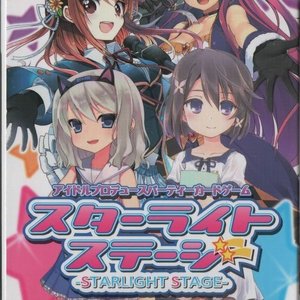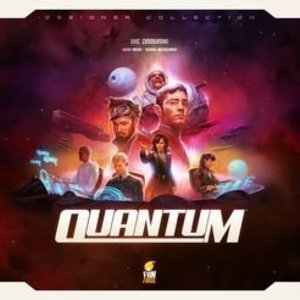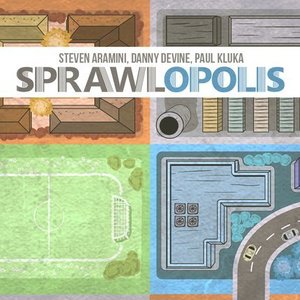Purple Phoenix Games (2266 KP) rated Starlight Stage in Tabletop Games
Jul 25, 2019
DISCLAIMER: I do not intend to cover every single rule included in the rule book, but will describe the overall game flow and major rule set so that our readers may get a sense of how the game plays. For more in depth rules, you may purchase a copy from the publisher directly or from your FLGS. -T
Starlight Stage is a deck building, card drafting, and set collection game with a very unique theme and art style. As with all deck builders, players start with a hand of beginner cards. In this case, all players are dealt the same hand of starter idol, model, and actress cards. These are collectively called “Idols,” which is confusing, but I will address that in my summary. Essentially, each different type of idol provides you with a different type of currency/energy/power/resource to use when buying or drafting newer, more powerful cards.
On your turn you MAY flip over a card from one of the three decks available – Idol, Fame, or Event cards. Then you play cards from your hand in order to acquire more cards from the offer rows. Typically, you may only use one idol card per purchase, unless you are purchasing an Event card – you may send more than one idol to an Event. If there are no cards that you want, or that you can afford to purchase, you may “take a lesson,” by grabbing a resource token.
Tired of using just the starter idol cards all the time? Idols may reinvent themselves to become stronger. You do this by exchanging your starter (or upgraded) idol card and adding supporting cards and tokens to purchase a stronger idol card. These will typically provide more currency used to purchase more and better cards from the offer rows as well as providing more end game VPs. Example (shown below): exchange your starting Model idol card (blue diamond) plus several other supporting cards and tokens to transform your current Model into Super Idol Saori Tenkawa, who now provides you with one of each resource each time she is played.
Play continues until the Fame deck runs out, and points from cards are tallied to determine the winner.
Components: This game is a ton of cards and some resource tokens. The cards are great quality and will hold up well to repeated use, but super fans of the game may want to sleeve them, as the cards will be handled quite a bit. The tokens are typical cardboard chits and feature the diamond, heart, or music note symbols that are used throughout the game. Overall, production quality is pretty good.
So here’s the rub. When I pulled this out to play with Josh and Laura, we were immediately impacted by the art on the cards. When I started to explain the game mechanics and flow, Laura just COULD NOT contain her giggles as I tried to tactfully cover how to make your girls do jobs and attend events so that they can later upgrade themselves. I have to admit, the theme is not one I am accustomed to nor one that I can really get behind. I understand I come from a different culture background than that which is depicted in this game, but the theme is a definite detraction for us. Similarly, the art on the cards ranges from cute and uniquely anime to outright demeaning and near softcore hentai (there is no real NSFW artwork on the cards, but I certainly will not be playing this with my son until he’s at least 18). The idea of employing only young females and assigning them to different jobs to gain more fame or sending them to photo shoot events in skimpy clothing is just not very PC and not very 21st Century American. Again, I cannot stress enough that I do understand where this game comes from and the intended audience, but that intended audience is certainly not a group of highly inclusive, mostly minority, LGBTQIA member and allies, gender equal, 30-something board game enthusiasts and reviewers.
That said, the game itself can provide an interesting play session, but I highly recommend only playing with a specific group of people that you know will tolerate its suggestive art and overtones. For us at Purple Phoenix Games, we suggest Starlight Stage consider reinventing itself with a different theme. Also, I think some alternate terminology could be used for the Idol deck of cards that contain Idol, Model, and Actress cards. A minor quip, but it should be stated. Perhaps with some “Americanizing,” or at least having it be more PC, it would then overcome its 6/18 score and be invited to Hollywood with Simon Cowell.
Jon Hansen (9 KP) rated Quantum in Tabletop Games
May 2, 2019
Quantum plays somewhat like risk, where you advance units to positions to capture objectives. The catch is that your units are dice- higher numbers can move further, but lower numbers are better in combat, and each has a special ability.
The game revolves around placing "Quantum Cubes", which your units build on planets. Each planet has a number and an amount of slots for quantum cubes to be placed, and to build a cube your units (which are literally dice) must add up the the number on the planet they are on.
Building quantum cubes allows you to select an "advancement card", which contain either permanent upgrades to your turns and abilities, or one-time powerful bonuses. All advancement cards feel meaningful and powerful, and which ones you select determine a lot of how your game will play out. You can "build" for combat, research, mobility, and even some weird other things like being able to change one of your dice once per turn either up one number or down one (and thus changing its abilities).
The game board is configurable tiles, so the "map" can be different each time, and support a faster or slower game, or more or less players (the game only comes with pieces for 4 players, but if you had the dice it wouldn't be hard to play extra with improvised pieces).
The game pacing is really well done; if all players know what they're doing, the race to place the final cube can be intense and exciting, as each player will end up with different strengths as they implement unique strategies to win.
We love quantum and have had a blast every time we've played it- we're expecting it to become a family favorite and for our copy to end up very well loved.
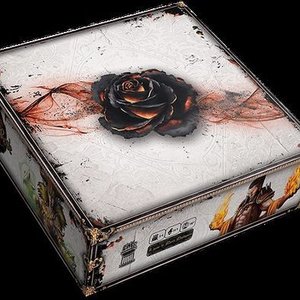
Black Rose Wars
Tabletop Game
Black Rose Wars is a fantasy board game for 2 up to 4 players. Each player becomes a Great...
BoardGames 2018Games
Purple Phoenix Games (2266 KP) rated Sprawlopolis in Tabletop Games
Jun 12, 2019
If you had the chance to design a city, how would you do it? Would you have a park on every block for some nice greenery, or do you think a large commercial district will bring in more people? What about housing – would people live right in the heart of the city, or would they live more on the outskirts? The day has finally come where those decisions are up to you! Well, mostly. You’ve been hired to help design the ultimate city! The city officials have given you some specific requirements, but beyond that, the plans are up to you! Can you meet their needs while also maximizing your space? It’s time to put your skills to the test and build the best city ever!
Sprawlopolis is a cooperative card placement game of only 18 cards. Given 3 random scoring conditions, you must draw and play cards into the city to fulfill those requirements. Meet or exceed their score, and you win the game! Fail to do so, and you have not succeeded in building the city up to specifications. Be careful how you decide to place your cards, however, because depending on the scoring conditions in play, certain placements could result in negative points at the end of the game. Working together, you and your team must decide which cards to play at what time to ensure that the requirements are all met. Solo play is identical to cooperative play, except that you just always have a hand of 3 cards from which to play. The score to beat each game is dependent on the scoring conditions, so this game isn’t just another beat-your-own-high-score game – you actually have a specific number in mind.
For a game with only 18 cards, there is a lot of variability in Sprawlopolis. I have yet to play 2 identical games. The layout of each card is unique, as are all of the scoring conditions, so the possibilities are endless… almost! I also enjoy playing this game solo because it requires a decent amount of strategy. Three things factor into your final score (the scoring conditions, block groupings, and roads) and it is impossible to succeed by focusing on only one of them. Your strategy is always changing based on the cards in your hand, and you really have to think about how to best utilize each card for maximum end-game points. Depending on when and where you play a card, it could change the entire city so you have to be thinking about the big picture, literally! And a neat thing about Sprawlopolis is that you can overlap cards. So maybe a card you played earlier is not really ideal anymore, given your current hand, so you can just cover up either a portion of it or the entire card!
The hardest thing about Sprawlopolis for me is that certain combinations of scoring conditions can be difficult to complete. One may give you points for a certain type of city block, but then another may take away as many, or more, points for that same type of city block. Or one gives you points for certain roads, but all roads result in negative points during end-game scoring. Since the scoring conditions are chosen randomly, there’s not really a way to negate this unless you just re-draw those cards. You usually can’t just look at a scoring condition combination and know if it will be difficult or not either – you just have to try it. I’m not saying they’re impossible necessarily, just harder to successfully complete.
Overall, I think Sprawlopolis is a neat game. It’s fast and easy to learn, yet strategic enough to keep you coming back for more games. I like to use it as a nice light filler game between some bigger games, or I just like to play it if I’ve got a quick 15 minutes to spare! Sprawlopolis is a fun game to play with a group, and it’s also a fun game to play solo. In my arsenal of solo games, it’s definitely one on standby.
https://purplephoenixgames.wordpress.com/2019/02/11/solo-chronicles-sprawlopolis/
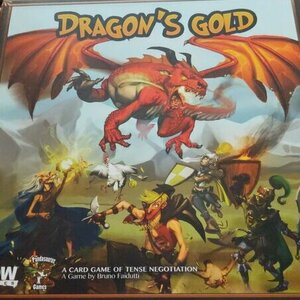
Dragon's Gold
Tabletop Game
Dragon's Gold is a game where you are fighting off dragon's in an attempt to take their gold....
Negotiation Board Game Tabletop Game Dragon's Gold
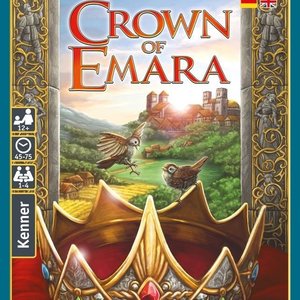
Crown of Emara
Tabletop Game
Good times in the tiny kingdom of Emara: During the reign of King Thedorius the Wise, wars,...
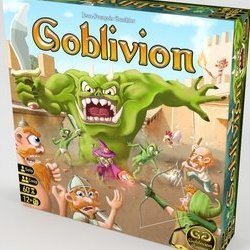
Goblivion
Tabletop Game
'Goblivion' is a Solo or 2 players cooperative deckbuilding card game. You play the role of the King...
Boardgames CardGames DeckBuildinggames
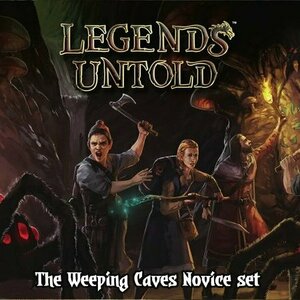
Legends Untold: The Weeping Caves Novice Set
Tabletop Game
Legends Untold is a co-operative card based adventure game for 1-8 players(4 players in the basic...
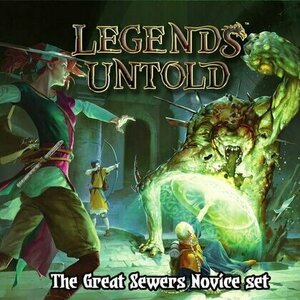
Legends Untold: The Great Sewers Novice Set
Tabletop Game
Legends Untold is a co-operative card based adventure game for 1-8 players(4 players in the basic...

Fantastiqa
Tabletop Game
Welcome to the wild, weird world of FANTASTIQA! Fantastiqa is a deck-building board game set in a...
